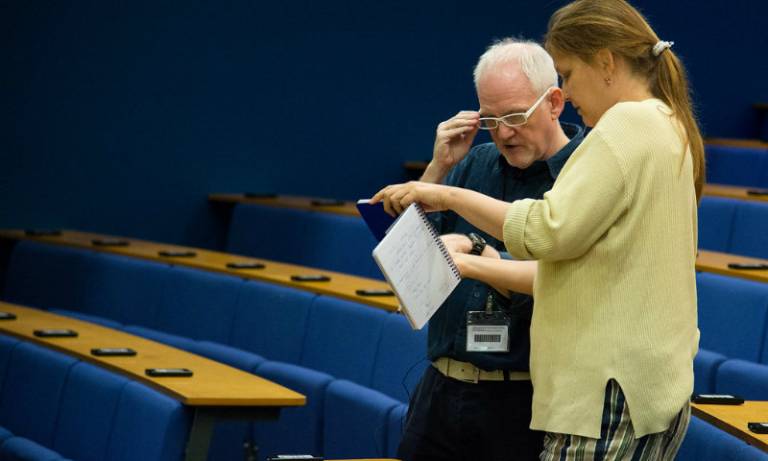Reflecting on interdisciplinary team teaching through peer dialogue
Dr Geraldine Brodie (Centre for Translation Studies) shares how the peer dialogue scheme enabled her team to share experiences in their different roles as convenors, lecturers and seminar-leaders.

24 May 2017
"We (Dr Geraldine Brodie, Dr Geraldine Horan, Tony McNeill and Christine Sas) met under the School of European Languages Culture and Society (SELCS) peer dialogue initiative to share our experiences and to reflect on the implications for teaching planning, assessment and feedback in a team-teaching environment.
The School of European Languages Culture and Society (SELCS) has since 2013 offered a range of European Languages Culture and Society (ELCS) modules which are taught across the School and also open to students from other departments and faculties, including the Bartlett, BASc, Slade and Social and Historical Sciences. Both teaching and learning participants therefore come from a wide range of disciplinary backgrounds.
Engaging in peer dialogue in small groups for the first time
Every member of staff in SELCS takes part in an annual peer observation of teaching.
This year for the first time we were offered the opportunity to choose between peer observation and engaging in a peer dialogue in small groups on any topic of teaching and learning.
As this was also the first year that we have taught ELCS modules in teams, this seemed like a good opportunity to discuss the challenges of team-marking and -feedback for larger groups of students.
The introduction of the new style of the ELCS modules also brought in a change from seminar (understood in its broadest sense) to the lecture plus seminar format. As this was new to most of us, it presented a further teaching challenge which we were keen to explore.
The four members of the group all have a strong interest in the theory and practice of teaching and learning, and between us we cover a range of team roles and modules, so we hoped to learn from each other by sharing our different involvements.
Small group dialogue encourages broader discussions in a positive environment
We had all previously participated in teaching and learning training, mainly in seminar format, and also peer observation of teaching.
This was our first experience of small group dialogue. We very much enjoyed the informality of the group and the opportunity to share any concerns in a positive environment.
Although we had originally intended to focus on marking and feedback, we found ourselves expanding our discussions to the wider implications of team teaching, as issues were often interconnected. Additional topics for discussion were also generated by studying some of the literature concerning team assessment.
Are there any strong themes that have come out of this process?
Under the SELCS guidelines, we were required to produce a paragraph summarising our discussions. We ultimately wrote a three-page report reflecting on the implications of our discussions and making recommendations for practical action in future years.
Two main themes came through very strongly:
- consistency both in the delivery of teaching and approaches to marking and feedback of assessed work.
- the importance of dialogue both within the teaching teams and across teams, and also with the students, so that all stakeholders feel that they are contributing to the teaching and learning effort, and sharing best practice.
As our discussions were taking place alongside the teaching process, we were informally incorporating some of our suggestions into our own practice – for example, approaches to the preparation of material to be taught in seminars by different colleagues.
Our full report has been sent to the SELCS Teaching Committee. A further consultation with all staff teaching on these modules has now been put into place for consideration with regard to future teaching approaches.
We will want to revisit these discussions next year to assess to what extent our suggestions have been put into place, and evaluate their effectiveness. We would like to explore module planning and the use of Moodle, including flipped lectures, in our teaching, perhaps in an expanded group.
Geraldine's advice if you're thinking about beginning a peer dialogue group
Go for it! They are very easy to set up, and it is great to have an informal space to speak freely to colleagues and learn from their experience.
Peer observation can work and be very rewarding, but it can also be rather perfunctory and unenlightening, depending on whom you are paired with and how s/he interprets the activity.
In the peer dialogue scheme, there is greater opportunity for sharing and reflecting, and it is less face-threatening than one-to-one peer observation.
I think we all enjoyed the relaxed atmosphere of our meetings. We also picked up little tips and ideas that we will put into use day-to-day in addition to the more formal recommendations stemming from our discussions.
 Close
Close

